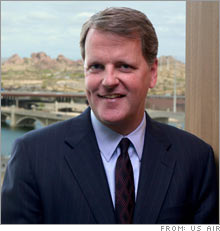Senators fly idea of airline re-regulationAt hearing on airline consolidation, wisdom of US Air bid for Delta is questioned, with some saying government oversight might be needed.NEW YORK (CNNMoney.com) -- Senators grilled US Airways CEO Douglas Parker about his company's hostile bid for Delta Air Lines at a hearing on airline consolidation Wednesday, with even some Republicans suggesting there could be a need for re-regulation of airlines if a new round of mergers take place. "I hear this from very conservative people in my state, they're asking for re-regulation of the airlines because of lack of service," said Sen. Ted Stevens, R-Alaska, at one point in the discussion.
Sen. Olympia Snowe, R-Maine, and Sen. Jay Rockefeller, D-W.Va., also argued that smaller communities have been hurt by consolidation in the industry, and they worried that flyers in their states would face higher fares if US Air (Charts) is allowed to buy Delta (Charts). Rockefeller said he was concerned that if the US Air-Delta deal went forward, it would prompt two more mergers between the four other large carriers - AMR Corp. (Charts) unit American Airlines and Northwest Airlines, and UAL Corp. (Charts) unit United Airlines and Continental Airlines (Charts) - with each of the resulting three carriers having more 24 percent or more of the market. "I don't think it has to come down to that [re-regulation] but I think it is something in that order," said Rockefeller. Sen. Byron Dorgan, D-N.D., also said he believes deregulation of the airline industry has been bad for smaller markets, saying it costs twice as much to fly to his home state from Washington than it does to fly to Los Angeles, which is twice as far away. "I think the market system is best way of allocating goods and services but I think it needs a referee," he said. "It's quite possible the market would say that air service only exists between the major cities." Delta CEO Gerald Grinstein, who spoke before a hearing room packed with Delta employees opposed to the deal, repeated his company's criticism of US Air's bid, saying that it would cause a sharp drop in competition and higher fares. "Small communities will certainly suffer," he said. "With less competition, fares will increase." And he questioned claims by US Air that the 2005 combination of America West and the then-bankrupt US Airways reduced fares. "For every market where US Air lowered the fares, fares increased in four other markets," Grinstein argued. "This deal is bad for Delta people bad for the traveling public." But Parker denied that the combined US Airways-Delta would raise fares, even in markets where they are now the only two major competitors. "We understand if we try to charge people in places like Portland, Maine, higher than reasonable prices, they will end up driving to Manchester," he said in response to Snowe's questions. And Parker argued that smaller communities are better served if there is more consolidation among the major carriers that have a network of hubs and spokes, such as US Air and Delta, because it will help them reduce costs and make the money they need to compete with lower fare carriers. "For those [senators] who have small communities, which the low cost carriers will never serve, you should be very concerned about the health of the network carriers," Parker said. "We need to encourage an industry that allows network carriers the opportunity to be profitable and not have us in the continual cycle of coming back to you every five or six years to ask for help." Parker said that while his airline and the other network carriers have done much to reduce cost and be more competitive with the low-fare carriers, there's no way to replicate the model of a Southwest Airlines in a hub-and-spoke network. "I'd prefer to own Southwest Airlines (Charts) than US Airways," he said in response to one question. "For the record I don't own either." Grinstein said he doesn't necessarily support re-regulation, although he argued that the Justice Department should and will block the US Air bid for Delta under existing law because it would reduce competition and raise fares in so many markets. "US Airways-Delta must be rejected because they [US Air officials] are blatantly anti-competitive. They are in fact our largest competitor and I believe we are their largest," he said. And Grinstein argued that if the deal does go through, it would necessarily lead to other mergers what would greatly consolidate the industry with less service. "Are you better off with six network carriers or with three? Are you better off with more hubs or less hubs?" said Grinstein. "Approve this, and what you're approving sets such a low standard, how are you going to say 'no' to United and Continental, how are you going to say 'no' to American and Northwest. Say 'yes' to this and you will devolve into three carriers." While a consumer advocate and a union official clearly weighed in against further airline mergers at the hearing, Andrew Steinberg, an assistant secretary in the Transportation Department, took a more neutral position in his testimony. But Steinberg did argue against re-regulation as unworkable, and his answer to questions seemed to suggest support for mergers between the nation's largest airlines. "History shows that most, though not all, mergers are not successful," he said. "I do believe size and scope in the airline industry are important, though. "Contrary to what some have suggested, having fewer, healthier network carriers could end up with more service to those [smaller] communities," he added later in the hearing. |
Sponsors
|


